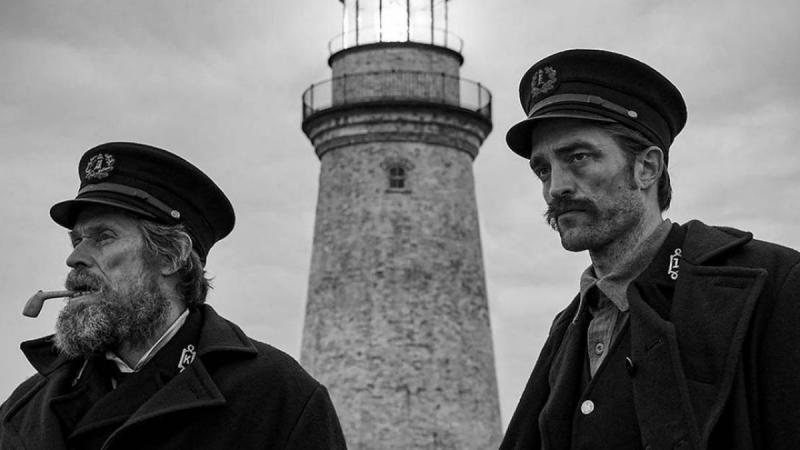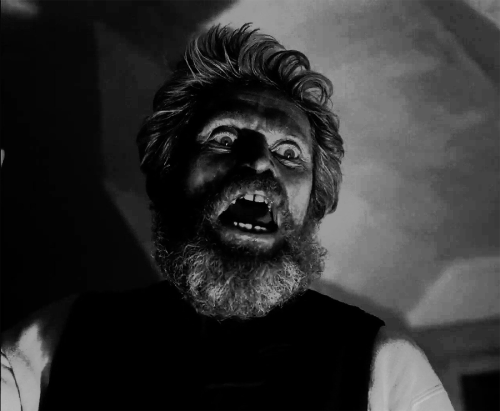The Lighthouse review - shiver me timbers | reviews, news & interviews
The Lighthouse review - shiver me timbers
The Lighthouse review - shiver me timbers
Dafoe and Pattinson on top form as keepers struggling to keep madness at bay

A creepy lighthouse on a remote island, a blistering storm, a mermaid languishing on the shore and two fabulously bewhiskered actors chewing up the scenery like there’s no tomorrow. The Lighthouse feels like it’s been washed up in a bottle, a film from another time with a story sprung from ghost stories or nightmares.
The American writer/director Robert Eggers really knows how to create mystery and a particular sense of unease. He follows his outstanding debut, the pre-Salem horror film The Witch, with another deeply atmospheric concoction, which doesn’t really feel like horror itself until the final moments – there’s way too much mirth – but picks away on the edges of it with a maniacal method that never loses its grip.
The 1890s. Lighthouse keepers Thomas Wick (Willem Dafoe) and Efraim Winslow (Robert Pattinson) disembark on the barren New England island, where they are to remain for a month. The isolation and relentlessly grim weather would naturally gnaw at anyone, but on top of that Wick and Winslow – a tyrannical old salt and paranoid newbie – make for mismatched, combative companions. When a storm extends their stay, they become locked into a psychotic battle of wits, with madness just around the corner.
The way Eggers fashions his film immediately announces something different: the screen has the boxy frame of early cinema, the image a grainy black and white, the soundscape alive with cacophonous, often indecipherable sounds, underpinned by a relentless foghorn.
 Moreover, the frisky, fruity dialogue of this intense two-hander (notwithstanding the presence of the mermaid, probably the figment of fevered imagination) is very much of its place and time, the director and his sibling co-writer Max Eggers drawing on sources that include Herman Melville and Robert Louis Stevenson.
Moreover, the frisky, fruity dialogue of this intense two-hander (notwithstanding the presence of the mermaid, probably the figment of fevered imagination) is very much of its place and time, the director and his sibling co-writer Max Eggers drawing on sources that include Herman Melville and Robert Louis Stevenson.
“Swab, dog, swab,” barks Wick at the younger man, who he insists perform all their menial tasks, while ascerting that “the light is mine.” A rich mix of cartoon pirate, Shakespearean tragedian and Pinteresque manipulator, Wick’s mood changes with the wind. At supper, with several drinks inside him, he will soften: “Curse me if there ain’t an old tar's spirit somewhere in you lad” being a seadog's worthy compliment; but when Winslow challenges his cooking, the old man bellows, “Damn ye! Let Neptune strike ye dead!” with a ferocity that suggests he’s about to reach for a trident himself.
With his creviced, jagged-toothed features captured in vividly lit close-up, Dafoe attacks his role with foot-stomping relish. Equally superb, Pattinson glowers and grumbles on a lower key, his frightening dark eyes signalling the greater threat. While Wick’s penchant for standing naked before the lantern is admittedly odd, it’s Winslow’s dreams and hallucinations – and his violence towards the local seagulls, inviting bad luck – that fill the film with foreboding.
The future of Arts Journalism
You can stop theartsdesk.com closing!
We urgently need financing to survive. Our fundraising drive has thus far raised £49,000 but we need to reach £100,000 or we will be forced to close. Please contribute here: https://gofund.me/c3f6033d
And if you can forward this information to anyone who might assist, we’d be grateful.

Subscribe to theartsdesk.com
Thank you for continuing to read our work on theartsdesk.com. For unlimited access to every article in its entirety, including our archive of more than 15,000 pieces, we're asking for £5 per month or £40 per year. We feel it's a very good deal, and hope you do too.
To take a subscription now simply click here.
And if you're looking for that extra gift for a friend or family member, why not treat them to a theartsdesk.com gift subscription?
more Film
 The Mastermind review - another slim but nourishing slice of Americana from Kelly Reichardt
Josh O'Connor is perfect casting as a cocky middle-class American adrift in the 1970s
The Mastermind review - another slim but nourishing slice of Americana from Kelly Reichardt
Josh O'Connor is perfect casting as a cocky middle-class American adrift in the 1970s
 Springsteen: Deliver Me From Nowhere review - the story of the Boss who isn't boss of his own head
A brooding trip on the Bruce Springsteen highway of hard knocks
Springsteen: Deliver Me From Nowhere review - the story of the Boss who isn't boss of his own head
A brooding trip on the Bruce Springsteen highway of hard knocks
 The Perfect Neighbor, Netflix review - Florida found-footage documentary is a harrowing watch
Sundance winner chronicles a death that should have been prevented
The Perfect Neighbor, Netflix review - Florida found-footage documentary is a harrowing watch
Sundance winner chronicles a death that should have been prevented
 Blu-ray: Le Quai des Brumes
Love twinkles in the gloom of Marcel Carné’s fogbound French poetic realist classic
Blu-ray: Le Quai des Brumes
Love twinkles in the gloom of Marcel Carné’s fogbound French poetic realist classic
 Frankenstein review - the Prometheus of the charnel house
Guillermo del Toro is fitfully inspired, but often lost in long-held ambitions
Frankenstein review - the Prometheus of the charnel house
Guillermo del Toro is fitfully inspired, but often lost in long-held ambitions
 London Film Festival 2025 - a Korean masterclass in black comedy and a Camus classic effectively realised
New films from Park Chan-wook, Gianfranco Rosi, François Ozon, Ildikó Enyedi and more
London Film Festival 2025 - a Korean masterclass in black comedy and a Camus classic effectively realised
New films from Park Chan-wook, Gianfranco Rosi, François Ozon, Ildikó Enyedi and more
 After the Hunt review - muddled #MeToo provocation
Julia Roberts excels despite misfiring drama
After the Hunt review - muddled #MeToo provocation
Julia Roberts excels despite misfiring drama
 Ballad of a Small Player review - Colin Farrell's all in as a gambler down on his luck
Conclave director Edward Berger swaps the Vatican for Asia's sin city
Ballad of a Small Player review - Colin Farrell's all in as a gambler down on his luck
Conclave director Edward Berger swaps the Vatican for Asia's sin city
 London Film Festival 2025 - Bradley Cooper channels John Bishop, the Boss goes to Nebraska, and a French pandemic
... not to mention Kristen Stewart's directing debut and a punchy prison drama
London Film Festival 2025 - Bradley Cooper channels John Bishop, the Boss goes to Nebraska, and a French pandemic
... not to mention Kristen Stewart's directing debut and a punchy prison drama
 London Film Festival 2025 - from paranoia in Brazil and Iran, to light relief in New York and Tuscany
'Jay Kelly' disappoints, 'It Was Just an Accident' doesn't
London Film Festival 2025 - from paranoia in Brazil and Iran, to light relief in New York and Tuscany
'Jay Kelly' disappoints, 'It Was Just an Accident' doesn't
 Iron Ladies review - working-class heroines of the Miners' Strike
Documentary salutes the staunch women who fought Thatcher's pit closures
Iron Ladies review - working-class heroines of the Miners' Strike
Documentary salutes the staunch women who fought Thatcher's pit closures
 Blu-ray: The Man in the White Suit
Ealing Studios' prescient black comedy, as sharp as ever
Blu-ray: The Man in the White Suit
Ealing Studios' prescient black comedy, as sharp as ever

Add comment